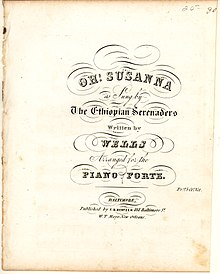오! 수잔나
Oh! Susanna| "오! 수잔나" | |
|---|---|
 악보 원본 (1848) | |
| 송 | |
| 출판된 | 1848 |
| 작곡가 | 스티븐 포스터 |
"오! 수잔나"는 1848년에 처음 출판된 스티븐 포스터 (1826–1864)의 음유시인 노래입니다. 그것은 지금까지 쓰여진 가장 인기 있는 미국 노래 중 하나입니다. 미국 서부 작가들의 회원들은 이 곡을 역대 서부 100대 노래 중 하나로 선정했습니다.[1]
배경
1846년, 스티븐 포스터는 오하이오 신시내티로 이사를 갔고, 그의 형의 증기선 회사에서 부기장이 되었습니다. 신시내티에 있는 동안, 포스터는 아마도 남성 사교 클럽을 위해 "오! 수잔나"를 썼습니다.[2][3] 이 노래는 1847년 9월 11일 펜실베니아 주 피츠버그의 앤드류스 이글 아이스크림 살롱에서 열린 콘서트에서 지역 5인조에 의해 처음으로 연주되었습니다.[4] 그것은 1848년 신시내티에서 W. C. Peters & Co.에 의해 처음 출판되었습니다.[5] 검은 얼굴의 음유시인 극단들이 이 작품을 공연했고, 당시에도 흔히 그러했듯이, 많은 사람들이 저작권을 위해 이 노래를 자신의 이름으로 등록했습니다. 그 결과 1848년 2월 25일부터 1851년 2월 14일까지 최소 21회에[6] 걸쳐 저작권이 인정되어 출판되었습니다.[3] 포스터는 이 곡으로 단 100달러(2016년[7] 2,774달러)를 벌었지만,[8] 그 인기로 인해 출판사 퍼스, 폰드 & 컴퍼니는 그에게 판매된 악보의 사본당 2센트의 로열티율을 제공하여 미국 최초의 완전 전문 작곡가가 되었습니다.[3][9][10]
수잔나라는 이름은 중간 이름이 수잔나였던 포스터의 죽은 여동생 샬롯을 지칭할 수도 있습니다.[11]
송
이 노래는 다양한 음악적 전통과 어우러집니다. 오프닝 대사는 "내 무릎에 밴조"를 가리키지만, 이 노래는 유럽에서 미국에 막 도착한 폴카에서 박자를 따왔습니다.[4][12] 작가이자 음악가인 글렌 바이저는 이 곡이 1846년 빌리 휘틀록의 〈Mary Blane〉과 실라스 S의 〈Rose of Alabama〉라는 두 개의 이전 작곡의 요소를 통합하고 있다고 제안합니다. 스틸. 그는 <오! 수잔나>의 구절의 선율이 <메리 블레인>의 그것과 닮았고, <오! 수잔나>의 후렴구의 오프닝은 <앨라배마의 장미>의 그것과 거의 동일하다고 지적합니다. 게다가, "Oh! Susanna"와 "The Rose of Alabama"의 이야기는 사랑하는 사람을 찾기 위해 그의 밴조와 함께 한 남부 깊은 주에서 다른 주로 가는 연인을 포함하는데, 이것은 포스터가 스틸의 노래에서 그의 가사에 대한 영감을 얻었음을 암시합니다.[13][self-published source]
멜로디의 첫 두 구절은 주요 5음계를 기반으로 합니다.[14] ⓘ
이 곡은 '말도 안 되는 소리'로 표현되어 온 "떠나던 날 밤새 비가 내리고, 날씨가 건조하고, 태양이 너무 뜨거워서 얼어 죽었는데..."와 같은 모순된 대사를 담고 있습니다.[3] 이 곡은 포스터의 "니거"라는 단어를 사용한 곡 중 하나입니다. (다른 곡들은 "Old Uncle Ned"와 "Oh! Lemuel"이며 둘 다 포스터의 초기 작품 중 하나입니다.) 2절에 등장합니다. (전기 유체가 확대되고 500명의 흑인을 죽였습니다.)[15]
인기와 적응
이 노래는 스티븐 포스터의 가장 잘 알려진 노래들 중 하나이며,[16] 또한 가장 잘 알려진 미국 노래들 중 하나입니다.[17] 그 어떤 미국 노래도 5,000장 이상 팔리지 않았고, "오! 수잔나"는 10만장 이상 팔렸습니다.[18] 출판 후, 그것은 "내 무릎에 빨래판"을 달고 캘리포니아로 여행하는 것에 대한 새로운 가사와 [16]함께 "40명의 비공식적인 주제"로 빠르게 알려졌습니다.[6] 전통적인 펜실베니아 네덜란드 버전은 포스터의 멜로디를 사용하지만 가사를 완전히 대체합니다.[19]
주목할 만한 기록
- 최초의 인종차별적인 가사를 사용한 초기 녹음 중 하나가 해리 C에 의해 공개되었습니다. 1916년 브라운 (Columbia COLA-2218).[citation needed]
- 이 노래는 1912년 민주당 전당대회 당시 윌슨(1944)의 밴드가 불렀습니다.[citation needed]
- 1955년 Singing Dogs의 이 노래의 새로운 녹음은 미국 빌보드 팝 싱글 차트에서 22위에 올랐고,[20] 영국에서는 13위에 올랐습니다.[21]
- 빙 크로스비는 이 곡을 그의 앨범 101 Gang Songs (1961)에 메들리로 수록했습니다.[citation needed]
- 1963년, 빅 3는 팀 로즈의 곡 "The Banjo Song"을 녹음했는데, 이 곡은 포스터의 가사를 완전히 새로운 멜로디로 설정합니다.[22] 로즈의 멜로디는 1969년 쇼킹 블루의 히트곡 비너스 (Shocking Blue song)에 사용되었습니다.[23] 닐 영과 크레이지 호스는 2012년 앨범 아메리카나에서 로즈 버전을 커버했습니다.[24]
- "Oh! Susanna"의 유머러스한 녹음은 The Byrds, Turn!의 두 번째 앨범의 마지막 트랙이었습니다. 턴! 돌림! 1965년에.[25][26]
- 제임스 테일러는 1970년에 그의 두 번째 앨범인 스위트 베이비 제임스에 이 곡의 버전을 수록하기도 했습니다.[27]
참고문헌
- ^ Western Writers of America (2010). "The Top 100 Western Songs". American Cowboy. Archived from the original on 19 October 2010.
- ^ 리처드 잭슨. 1974. 스티븐 포스터 송북: 40곡의 독창적인 악보. 택배 기사 도버 프레스 177쪽.
- ^ a b c d "Foster Stephen C(ollins)", Baker's Biographical Dictionary of Musicians, Gale, 2001, archived from the original on 2013-10-11, retrieved 2012-04-25
- ^ a b Zwerdling, Daniel (1997-09-13), "Stephen Foster", NPR Weekend All Things Considered, National Public Radio, archived from the original on 2013-10-11, retrieved 2012-04-25
- ^ "Oh! Susanna". 2008. Archived from the original on 2012-03-27.
- ^ a b Behe, Rege (2009-06-28), "Stephen Foster really did write songs the whole world sang.", Pittsburgh Tribune-Review, Trib Total Media, Inc.[데드링크]
- ^ 1634–1699: 1700–1799: 1800–현재:
- ^ Cahill, Greg (2008-11-14), "Oh! Stephen Foster", Pacific Sun, Pacific Sun, archived from the original on 2013-10-11, retrieved 2012-04-25,
But popularity didn't translate into success. His ebullient "Oh! Susanna" became the theme song of the Gold Rush, but Foster earned just $100 for that hit because crooked publishers failed to pay his royalties.
- ^ Marks, Rusty (2001-04-22), "ON TELEVISION: Stephen Foster: Quintessential songwriter lived in music, died in ruin", Sunday Gazette-Mail, Gazette Daily Inc., archived from the original on 2013-10-11, retrieved 2012-04-25,
The song, written in 1847, soon spread throughout the country. Foster decided to become a full-time songwriter, a vocation no one had bothered to pursue until then.
- ^ PITTSBURGH NATIVE SON AND SONGWRITER STEPHEN FOSTER TO BE INDUCTED INTO NASHVILLE SONGWRITERS HALL OF FAME OCT. 17., US Fed News Service, Including US State News. The Associated Newspapers of Ceylon Ltd., 2010-10-16, archived from the original on 2013-10-11, retrieved 2012-04-25
- ^ 마이클 새플. 2000. 미국 음악에 대한 관점, 1900-1950 Taylor & Francis. 382쪽.
- ^ Gross, Terry (2010-04-16), "The Lyrics And Legacy Of Stephen Foster", NPR Fresh Air, National Public Radio, archived from the original on 2014-08-08, retrieved 2012-04-25,
Mr. EMERSON: I think that Stephen Foster really did create popular music as we still recognize it today. He did it because he took together all these strands of the American experience. That song is extremely Irish in its origins, just as other songs are extremely African-American, just as others are extremely Italian and operatic, or sometimes German, and even Czechoslovakian. For instance, the beat of "Oh! Susanna" is the beat of a polka. He's clearly effectively merged them into a single music. And I think he merged them in way that appeals to the multicultural mongrel experience of America in its history and culture.
- ^ "Oh! Susanna by Stephen Foster — Likely Origins". Celticguitarmusic.com. Retrieved 2011-07-01.[셀프 published 소스]
- ^ Benward & Saker (2003). 음악: 이론과 실천에서, 제1권. 저, 37쪽. 제7판. ISBN 978-0-07-294262-0.
- ^ Resnikoff, Paul (2017-10-13). "The Original Lyrics to 'Oh Susanna' Are Brutally Racist". Digital Music News. Retrieved 2023-05-30.
- ^ a b Tuleja, Tad (1994), "Oh, Susanna", The New York Public Library Book of Popular Americana, Macmillan Reference US, archived from the original on 2014-06-11, retrieved 2012-04-25
- ^ "MEMORABILIA COLLECTION HONORS COMPOSER MUSICIAN WROTE 'OH, SUSANNA'", The Cincinnati Post, Dialog LLC, 2002-03-21, archived from the original on 2014-06-11, retrieved 2012-04-25
- ^ Stephen Foster 2012-10-30 at the Wayback Machine, Meet the Musicians; 2012.09.11에 액세스했습니다.
- ^ Lieder der Pennsylvania Dutch (II), retrieved 2012-04-25
- ^ Whitburn, Joel (2009), Top Pop Singles 1955–2008, Record Research, Milwaukee, Wisconsin
- ^ "The Singing Dogs". The Official Charts Company.
- ^ "Oh Susanna (The Banjo Song)", Allmusic, retrieved 2012-04-25
- ^ [1][데드링크]
- ^ "Americana – Neil Young & Crazy Horse", Allmusic.com, retrieved 2012-05-09
- ^ Interview with Roger McGuinn of the Byrds – February 1970, Vincent Flanders: His Personal Web Site, retrieved 2012-04-25
- ^ "Turn! Turn! Turn!", Allmusic, retrieved 2012-04-25
- ^ "Sweet Baby James", Allmusic, retrieved 2012-04-25




